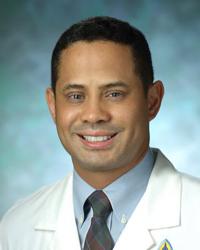Research Lab Results
-
Venu Raman Research Lab
The Raman laboratory is within the Division of Cancer Imaging Research in the Department of Radiology and Radiological Science. The focus of the laboratory is bench-to-bed side cancer research. We integrate molecular and cellular biology, developmental biology, cancer biology, molecular imaging techniques to study cancer formation and progression. Many of the projects in the lab investigate dysregulated genes in cancer and the translatability of this information to a clinical setting. One such project is to functionally decipher the role of a RNA helicase gene, DDX3, in the biogenesis of multiple cancer types such as breast, lung, brain, sarcoma, colorectal and prostate. Additionally, using a rational drug design approach, a small molecule inhibitor of DDX3 (RK-33) was synthesized and its potential for clinical translation is being investigated.
-
Lamichhane Lab
Our research focuses on the biology of the peptidoglycan of Mycobacterium tuberculosis, the organism that causes tuberculosis, and Mycobacteroides abscessus, a related bacterium that causes opportunistic infections. We study basic mechanisms associated with peptidoglycan physiology but with an intent to leverage our findings to develop tools that will be useful in the clinic to treat mycobacterial infections. Peptidoglycan is the exoskeleton of bacteria that not only provides structural rigidity and cell shape but also several vital physiological functions. Breaching this structure is often lethal to bacteria. We are exploring fundamental mechanisms by which bacteria synthesize and preserve their peptidoglycan. Although our lab uses genetic, biochemical and biophysical approaches to study the peptidoglycan, we pursue questions irrespective of the expertise required to answer those questions. It is through these studies that we identified synergy between two beta-lactam antibiotics against select mycobacteria. -
Liliana Florea Lab
Research in the Liliana Florea Lab applies computational techniques toward modeling and problem solving in biology and genetic medicine. We work to develop computational methods for analyzing large-scale sequencing data to help characterize molecular mechanisms of diseases. The specific application areas of our research include genome analysis and comparison, cDNA-to-genome alignment, gene and alternative splicing annotation, RNA editing, microbial comparative genomics, miRNA genomics and computational vaccine design. Our most recent studies seek to achieve accurate and efficient RNA-seq correction and explore the role of HCV viral miRNA in hepatocellular carcinoma.
-
Karakousis Lab
The Karakousis Lab is primarily focused on understanding the molecular basis of Mycobacterium tuberculosis persistence and antibiotic tolerance. A systems biology-based approach, including the use of several novel in vitro and animal models, in combination with transcriptional, proteomic, genetic, imaging, and computational techniques, is being used to identify host cytokine networks responsible for immunological control of M. tuberculosis growth, as well as M. tuberculosis regulatory and metabolic pathways required for bacillary growth restriction and reactivation. In particular, we are actively investigating the regulatory cascade involved in the mycobacterial stringent response. Another major focus of the lab is the development of host-directed therapies for TB, with the goal of shortening treatment and improving long-term lung function. Additional research interests include the development of novel molecular assays for the rapid diagnosis of latent TB infection and active TB disease, and for the detection of drug resistance. -
Kass Lab
Basic science investigations span an array of inquiries, such as understanding the basic mechanisms underlying cardiac dyssynchrony and resynchronization in the failing heart, and beneficial influences of nitric oxide/cGMP/protein kinase G and cGMP-targeted phosphdiesterase signaling cascades on cardiac maladaptive stress remodeling. Recently, the latter has particularly focused on the role of phosphodiesterase type 5 and its pharmacologic inhibitors (e.g. sildenafi, Viagra®), on myocyte signaling cascades modulated by protein kinase G, and on the nitric oxide synthase dysregulation coupled with oxidant stress. The lab also conducts clinical research and is presently exploring new treatments for heart failure with a preserved ejection fraction, studying ventricular-arterial interaction and its role in adverse heart-vessel coupling in left heart failure and pulmonary hypertension, and testing new drug, device, and cell therapies for heart disease. A major theme has been with the use of advanced non-invasive and invasive catheterization-based methods to assess cardiac mechanics in patients.asive and invasive catheterization-based methods to assess cardiac mechanics in patients. David Kass, MD, is currently the Director at the Johns Hopkins Center for Molecular Cardiobiology and a professor in cellular and molecular medicine. -
Kunisaki Lab
The Kunisaki lab is a NIH-funded regenerative medicine group within the Division of General Pediatric Surgery at Johns Hopkins that works at the interface of stem cells, mechanobiology, and materials science. We seek to understand how biomaterials and mechanical forces affect developing tissues relevant to pediatric surgical disorders. To accomplish these aims, we take a developmental biology approach using induced pluripotent stem cells and other progenitor cell populations to understand the cellular and molecular mechanisms by which fetal organs develop in disease.
Our lab projects can be broadly divided into three major areas: 1) fetal spinal cord regeneration 2) fetal lung development 3) esophageal regeneration
Lab members: Juan Biancotti, PhD (Instructor/lab manager); Annie Sescleifer, MD (postdoc surgical resident); Kyra Halbert-Elliott (med student), Ciaran Bubb (undergrad)
Recent publications:
Kunisaki SM, Jiang G, Biancotti JC, Ho KKY, Dye BR, Liu AP, Spence JR. Human induced pluripotent stem cell-derived lung organoids in an ex vivo model of congenital diaphragmatic hernia fetal lung. Stem Cells Translational Medicine 2021, PMID: 32949227Biancotti JC, Walker KA, Jiang G, Di Bernardo J, Shea LD, Kunisaki SM. Hydrogel and neural progenitor cell delivery supports organotypic fetal spinal cord development in an ex vivo model of prenatal spina bifida repair. Journal of Tissue Engineering 2020, PMID: 32782773.
Kunisaki SM. Amniotic fluid stem cells for the treatment of surgical disorders in the fetus and neonate. Stem Cells Translational Medicine 2018, 7:767-773

-
Neuroengineering and Biomedical Instrumentation Lab
The mission and interest of the neuroengineering and Biomedical Instrumentation Lab is to develop novel instrumentation and technologies to study the brain at several levels--from single cell to the whole brain--with the goal of translating the work into practical research and clinical applications. Our personnel include diverse, independent-minded and entrepreneurial students, post docs, and research faculty who base their research on modern microfabrication, stem cell biology, electrophysiology, signal processing, image processing, and integrated circuit design technologies. -
Haughey Lab: Neurodegenerative and Neuroinfectious Disease
Dr. Haughey directs a disease-oriented research program that address questions in basic neurobiology, and clinical neurology. The primary research interests of the laboratory are: 1. To identify biomarkers markers for neurodegenerative diseases including HIV-Associated Neurocognitive Disorders, Multiple Sclerosis, and Alzheimer’s disease. In these studies, blood and cerebral spinal fluid samples obtained from ongoing clinical studies are analyzed for metabolic profiles through a variety of biochemical, mass spectrometry and bioinformatic techniques. These biomarkers can then be used in the diagnosis of disease, as prognostic indicators to predict disease trajectory, or as surrogate markers to track the effectiveness of disease modifying interventions. 2. To better understand how the lipid components of neuronal, and glial membranes interact with proteins to regulate signal transduction associated with differentiation, motility, inflammatory signaling, survival, and neuronal excitability. 3. To understand how extracellular vesicles (exosomes) released from brain resident cells regulate neuronal excitability, neural network activity, and peripheral immune responses to central nervous system damage and infections. 4. To develop small molecule therapeutics that regulate lipid metabolism as a neuroprotective and restorative strategy for neurodegenerative conditions. -
The Nauen Lab
Epilepsy affects 1-3% of the population and can have a profound impact on general health, employment and quality of life. Medial temporal lobe epilepsy (MTLE) develops in some patients following head injury or repeated febrile seizures. Those affected may first suffer spontaneous seizures many years after the initial insult, indicating that the neural circuit undergoes a slow pathologic remodeling over the interim. There are currently no methods of preventing the development of MTLE. It is our goal to better understand the process in order to slow, halt, and ultimately reverse it. Our laboratory draws on electrophysiology, molecular biology, and morphology to study the contribution of dysregulated neurogenesis and newborn neuron connectivity to the development of MTLE. We build on basic research in stem cell biology, hippocampal development, and synaptic plasticity. We work closely with colleagues in the Institute for Cell Engineering, Neurology, Neurosurgery, Biomedical Engineering, and Radiology. As physician neuropathologists our grounding is in tissue alterations underlying human neurologic disease; using human iPSC-derived neurons and surgical specimens we focus on the pathophysiological processes as they occur in patients. By understanding changes in cell populations and morphologies that affect the circuit, and identifying pathologic alterations in gene expression that lead to the cell-level abnormalities, we hope to find treatment targets that can prevent the remodeling and break the feedback loop of abnormal activity > circuit change > abnormal activity. -
Robert Wise Lab
The Robert Wise Lab conducts clinical trials to study chronic obstructive lung diseases (COPD). We investigate inhaled corticosteroids in patients with mild to moderate COPD and the effectiveness of anti-inflammatories in allowing lung growth in mild to moderate asthmatic children. Our research includes exploring the efficacy of various treatments for asthmatic women who are pregnant and of lung-volume reduction surgery for emphysema patients. We also conduct studies of the clinical epidemiology, pathobiology and treatment of interstitial lung disease in patients with scleroderma.





